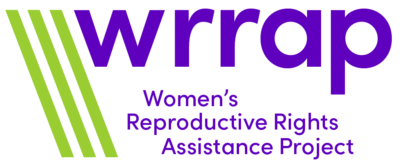What are abortion funds?
Abortion funds provide financial assistance to individuals who cannot afford the costs of an abortion or emergency contraceptives (ECs).
WRRAP is a nationwide, independent abortion fund providing help for individuals in all 50 states, while abiding by all laws and regulations. WRRAP plays an important role in funding abortion services for individuals when health insurance may not cover the cost of the abortion, or when there are other obstacles in the way of care that increase the cost.
We work directly with pre-qualified, reputable reproductive health clinics across the U.S. on behalf of the person in need. WRRAP does not demand repayment of the funds.
How do abortion funds work?
WRRAP does not send funds directly to individuals. Instead, we work with pre-screened, pre-approved health clinics, hospitals, and doctors, who contact us on behalf of the individual seeking abortion services and who needs financial assistance. We have over 700 health clinics and providers in our WRRAP-affiliated network. They are pre-screened to ensure they are legitimate and provide the highest standard of medical care.
Once an individual chooses a clinic or abortion provider, that provider will interview the individual to discuss the patient’s financial contribution. If the patient does not have enough money to cover the procedure, the provider will then reach out to WRRAP and/or a local abortion fund to discuss covering the remainder of the cost for the patient. WRRAP then determines the amount of financial assistance that they will fund based on each individual’s need. Funds are then sent directly to the heath clinic or provider, earmarked for the patient.
Based on what the total cost for the abortion is, WRRAP resources are then combined with those of other local funds to increase the total funds available for the individual’s care.
Anyone who is seeking abortion care services and who is in need of funding should discuss WRRAP with their clinic or provider.
All WRRAP funding is pledged prior to a patient’s procedure, not after, so it is important that individuals discuss any funding needs with their clinic of choice in the beginning.
Why are independent abortion funds needed?
Cost and access are common barriers to abortion care in the United States. The cost of an abortion varies by medical facility, type of abortion, and gestation of the pregnancy. The median cost in the first trimester is estimated to be about $500 for either medical or surgical procedures, and about twice as much in the second trimester. This does not include non-medical costs, such as transportation, lodging, childcare, and lost wages.
State and federal legislation are negatively impacting abortion accessibility and increasing the financial barriers. In the U.S., federal funding for abortion through Medicaid, the public health insurance program for low-income people, is banned due to the Hyde Amendment except for cases of incest, rape, and life endangerment. As of 2021, there have been 106 abortion restrictions enacted in 19 states, plus 663 anti-abortion laws introduced across 16 states to restrict medication abortion, with 8 of those states enacting these restrictions.
U.S. abortion patients are disproportionately poor or low-income individuals, and most do not have access to insurance coverage that pays for abortion care. Private health insurance does not always cover abortion, and public health insurance only covers abortions within certain circumstances. As a result, the majority of abortion patients incur high out-of-pocket costs when receiving abortion care. The high out-of-pocket costs contribute to delays in individuals seeking abortion care, which can further increase costs for the procedure and for travel to clinics that offer abortions at a later gestation.
Restrictions on abortion access and financial barriers are discriminatory because they disproportionately burden poor women, young women, women of color, military women, federally-employed women, and rural women. Abortion is a component of basic healthcare — a right that should be guaranteed to all.



